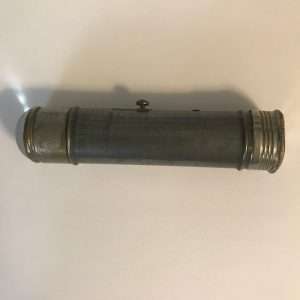At the age of eighteen, my grandmother found employment in the post office savings bank as a sorting assistant. It was January 1927 and post office work was something coveted. Offering steady pay and a pension at the end, a career with the post office might not have been exciting, but was stable and secure. Among the colleagues the young Marjorie Bennett came to know was Johanna “Hannie” Collins, from Clonakilty in West Cork. Hannie Collins was almost thirty years senior to the young assistant and had joined the post office in London in 1899, when nineteen years old (and would remain in the post office in London until her retirement in 1940, at the age of sixty).
Given their age difference, Hannie Collins must have seemed like an honorary aunt to the young Marjorie. On one occasion, perhaps Marjorie’s 21st birthday in January 1930, Hannie gave her the gift of a pocket torch. It was a gift that Marjorie much valued because it was said to have belonged to Hannie’s younger brother, Michael, who had for fifteen years lived in London with Hannie.
Of course, the torch came with no written provenance. There are post office records showing Hannie Collins and Marjorie Bennett worked in the post office savings bank – but there is nothing more than family tradition to say that they knew each other, or to say that the antique torch had come from the Collins household. To have hoped their might be a provenance would have been naive. Who would keep a written record of whom they knew at work? And who would give a gift like a pocket torch with a documentary evidence attached?
What is notable is that Michael Collins had become an iconic figure by 1930, that, within a decade of his death in an ambush at Béal na Bláth in Co Cork on this day in August 1922, to be given something that was said to have belonged to him was thought a privilege.
Hannie Collins must have had numerous things that had belonged to her late brother, perhaps such mementos were sprinkled across west London, including other torches he might once have used. Now, if there was a piece of paper declaring this torch had been used by Collins in 1921, during his time in London negotiating the fateful Anglo-Irish Treaty, a treaty that would lead to his assassination, then my grandmother’s torch would escalate in value. But even if someone were to offer a large sum of money, why would it ever be for sale? If something has been valued for three generations, then, hopefully, it will remain valued for generations to come.
